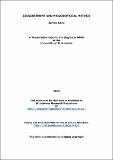Disagreement and philosophical method
Abstract
This dissertation is primarily concerned with the subjects of disagreement,
argument, and the methodology of philosophy. The first chapter sets out and
attempts to answer the question of what the connection between disagreement
and disputing is. The second chapter is primarily a investigation into the nature
of verbal disputes. The answer the chapter puts forward is that there is a
justificatory relation (or at least we behave as if there is one) between disagreeing
and disputing, so that, for example, if two parties do not disagree in the right
way, then they (prima facie) should not dispute. In the second chapter I will look at
a few theories of verbal disputes, and I will discuss some of the features such a
theory should have. I go on to explicitly endorse a version of David Chalmers's
theory of verbal disputes, and defend it from some potential objections. The third
chapter is a defence of the method of conceptual analysis in philosophy. I
introduce some potential objections to the Canberra plan style of conceptual
analysis, and show how a different conception of conceptual analyses could get
over these problems. The conception of conceptual analysis I argue for is heavily
inspired by Rudolf Carnap's system of explication. The main way Carnapian
explication would differ from the Canberra plan style of conceptual analysis is in
the way that it would allow one to move further away from the original concept
in analysing it, by balancing closeness to the original concept against other
specific criteria.
Type
Thesis, MPhil Master of Philosophy
Collections
Items in the St Andrews Research Repository are protected by copyright, with all rights reserved, unless otherwise indicated.

